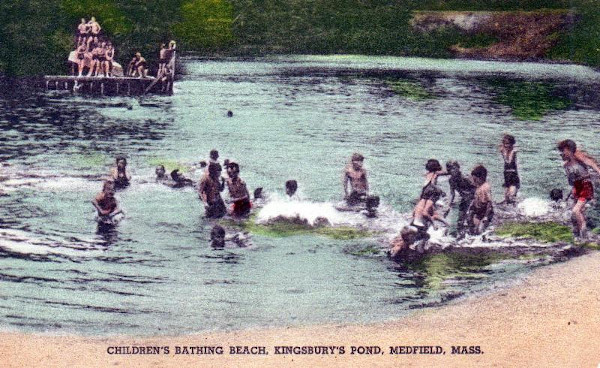July 25, 2024
Thanks in part to its location along the Charles River and other waterways, Medfield has long been known for its abundant natural resources. It’s these very resources that attracted city dwellers to the town centuries ago.
In the late 1800s and into 1920s, Bostonians arrived to purchase large farms and convert them to summer homes and estates. Others of more modest means set up rustic summer camp tents and shacks in the Causeway-Dwight Street areas of Medfield and Millis (known as Clark’s Camps), with some of the structures still standing today.
In “History of the Town of Medfield – 1887 to 1925,” Richard DeSorgher noted that the Clark’s Camps were established in the 1880s by Joe Clark, a Civil War veteran who believed living outdoors during the summer was “the ideal existence.” After the initial tent was pitched, subsequent summers saw family members and others following suit with more tents or cottages being built. A music hall, henhouse and cook’s house were then added later. Families would reside in the camps from about June to September/October, depending on the weather.
DeSorgher pointed out that by 1908, the custom of nude swimming in the Charles River near the camps had been threatened as more and more tents and shacks were erected by summer campers. Over time, and especially after the Medfield-Millis Dwight Bridge washed out in 1936, the camps dwindled in popularity.
Elsewhere in town, an especially affluent population of summer residents arrived in Medfield in the early 1990s representing high society. Large homes and estates were built, complete with landscaped lawns, fountains, fishponds and tennis courts, as chronicled by DeSorgher. The summer residencies included properties owned by a “who’s who” of prominent individuals, including Helen and J.F. McElwain, whose property at 55 Elm St. became known as “Holiday Farm” (which still exists today). J.F. McElwain was co-founder of the Thom McAn Shoe Company.
As the years progressed, Medfield never lost its reputation as a community that valued open space and recreation. Properties were increasingly purchased by the town or given as gifts with the goal of protecting the land from development. Rocky Woods, now owned by Trustees, is one such protected property made possible by the generosity of Dr. Joel Goldthwait. Over a period of about 20 years, Goldthwait purchased woodlots in Rocky Woods and created riding and walking trails. In 1942, he donated 300 acres of the land to establish the reservation.

In the 1950s, Kingsbury Pond was a popular summer swimming hole, as well as a boating and fishing spot for locals seeking bass, catfish and snapper. According to Tim Flaherty, a frequent contributor to The Portal, the pond had a small beach, and a raft was placed out in the water. Swimming lessons were held five days a week.
However, after just three seasons, the privately owned pond was placed off limits for public swimming by owner Blanche Kingsbury after boys threw rocks at her stained-glass windows, breaking nearly all of them.
While the town ultimately became owners of Kingsbury Pond Grist Mill and land immediately adjacent to the pond for historic preservation, and conservation and recreation purposes, much of the original adjacent Kingsbury-owned land was put up for sale and purchased by a developer who created the private Grist Mill Rd. subdivision with restricted access to the pond.
In June 1962, about a decade after the Kingsbury Pond swimming hole was closed to the public, the Stephen Hinkley Swim Pond opened on Green Street. Today the pond continues to serve as a summer destination for hundreds of families. In addition to pond memberships and one-day passes, children can now enjoy a newly opened Hinkley Playground, made possible through community donations and significant grants.
While the old-time 4th of July celebrations featuring community band shows and fireworks have long disappeared from local traditions, over the course of many decades, citizens have prioritized protecting Medfield’s open space to benefit future generations – and without the need for summer camp membership.